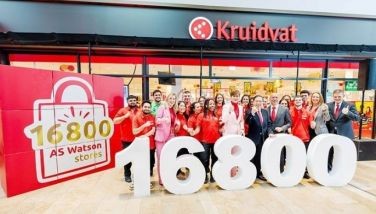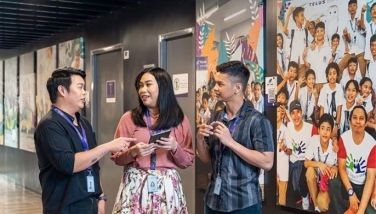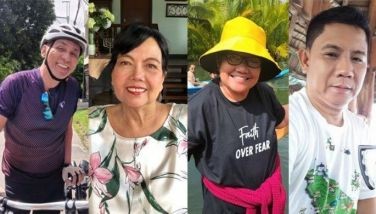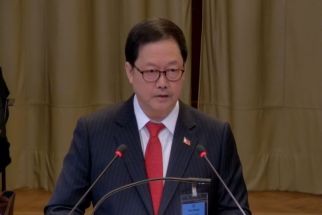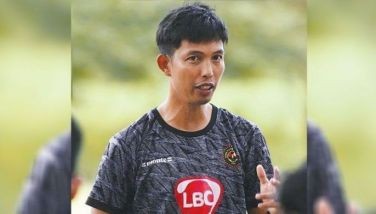‘Education is means to bridge gap between Christians, Muslims’
June 11, 2006 | 12:00am
In the elusive quest for peace in Muslim Mindanao, a Madrasah education system for primary and secondary-level students could well be the start of something to bridge the government and the Muslims in achieving reconciliation and national unity.
At the launch of Department of Education’s Madrasah program in the National Capital Region (NCR) held at the Commonwealth Elementary School in Quezon City, acting secretary Fe Hidalgo said education and the introduction of a Madrasah curriculum could be a tool to bring together Muslims and Christians.
"We come together as Filipinos, whether Christians and Muslims, we come together as Filipinos wanting to learn some more and achieve the goal of education," said Hidalgo before parents, teachers and students of the Commonwealth Elementary School.
The DepEd launched the Madrasah program in public elementary schools at the first and second grade levels. More than 1,800 Muslim public school students in the NCR stand to benefit from the Madrasah program.
In her speech, Hidalgo underscored the value of education and how it could be utilized to achieve the goal of peace.
"Education is a means by which we arrive at the goal of peace and national unity. I quote Martin Luther King Jr., who said that ‘peace is not merely a distant goal that we seek, but a means by which we arrive at that goal,’" Hidalgo said.
She said the integration of the Madrasah curriculum would open the minds of every Muslim child to vast areas of knowledge.
"All children must be given formal educational opportunity irrespective of race, color, religion or culture. Additionally, our memorandum says in the interest of national unity and implementation of the 1996 peace agreement, Madrasah education is declared a vital component of the national education system," she said.
DepEd Undersecretary for Muslim Affairs Manaros Boransing shared Hidalgo’s view, adding that the Madrasah program is part of the peace agreement between the Moro National Liberation Front (MNLF) and Philippine government.
Under the Madrasah curriculum, elementary students are taught lessons in Arabic language incorporating Islamic values, aside from lessons in primary education subjects like English, math, science, Filipino and Makabayan.
The Madrasah curriculum was implemented in 2005 and pilot-tested in Manila, Taguig, Pasay City, Parañaque City and Quezon City.
DepEd Usec Boransing said the Madrasah curriculum would be introduced in Caloocan City, San Juan, Pasig City and Muntinlupa City for this year.
"It has not been implemented for sometime. We started planning the curriculum way back 2002 to 2003 but it was only in August 2005 when we started implementing this curriculum during the term of Hidalgo," Boransing noted.
Meanwhile, in a show of support for the Madrasah program, the Islamic Call Society of Libya, the Australian Aid (AUSAID) under their Expanded Support for Muslim Education Program, and the joint Third Elementary Education Project (TEEP) and World Bank have donated money for the printing of Madrasah textbooks that could be utilized by high school students from first year to fourth.
At the ceremonies yesterday, the Islamic Call Society of Libya also donated two textbooks each to grade 1 and 2 students of the Commonwealth Elementary School.
The DepEd thanked the city government of Quezon City headed by Mayor Feliciano Belmonte Jr. for their support of the Madrasah education in the city.
At the launch of Department of Education’s Madrasah program in the National Capital Region (NCR) held at the Commonwealth Elementary School in Quezon City, acting secretary Fe Hidalgo said education and the introduction of a Madrasah curriculum could be a tool to bring together Muslims and Christians.
"We come together as Filipinos, whether Christians and Muslims, we come together as Filipinos wanting to learn some more and achieve the goal of education," said Hidalgo before parents, teachers and students of the Commonwealth Elementary School.
The DepEd launched the Madrasah program in public elementary schools at the first and second grade levels. More than 1,800 Muslim public school students in the NCR stand to benefit from the Madrasah program.
In her speech, Hidalgo underscored the value of education and how it could be utilized to achieve the goal of peace.
"Education is a means by which we arrive at the goal of peace and national unity. I quote Martin Luther King Jr., who said that ‘peace is not merely a distant goal that we seek, but a means by which we arrive at that goal,’" Hidalgo said.
She said the integration of the Madrasah curriculum would open the minds of every Muslim child to vast areas of knowledge.
"All children must be given formal educational opportunity irrespective of race, color, religion or culture. Additionally, our memorandum says in the interest of national unity and implementation of the 1996 peace agreement, Madrasah education is declared a vital component of the national education system," she said.
DepEd Undersecretary for Muslim Affairs Manaros Boransing shared Hidalgo’s view, adding that the Madrasah program is part of the peace agreement between the Moro National Liberation Front (MNLF) and Philippine government.
Under the Madrasah curriculum, elementary students are taught lessons in Arabic language incorporating Islamic values, aside from lessons in primary education subjects like English, math, science, Filipino and Makabayan.
The Madrasah curriculum was implemented in 2005 and pilot-tested in Manila, Taguig, Pasay City, Parañaque City and Quezon City.
DepEd Usec Boransing said the Madrasah curriculum would be introduced in Caloocan City, San Juan, Pasig City and Muntinlupa City for this year.
"It has not been implemented for sometime. We started planning the curriculum way back 2002 to 2003 but it was only in August 2005 when we started implementing this curriculum during the term of Hidalgo," Boransing noted.
Meanwhile, in a show of support for the Madrasah program, the Islamic Call Society of Libya, the Australian Aid (AUSAID) under their Expanded Support for Muslim Education Program, and the joint Third Elementary Education Project (TEEP) and World Bank have donated money for the printing of Madrasah textbooks that could be utilized by high school students from first year to fourth.
At the ceremonies yesterday, the Islamic Call Society of Libya also donated two textbooks each to grade 1 and 2 students of the Commonwealth Elementary School.
The DepEd thanked the city government of Quezon City headed by Mayor Feliciano Belmonte Jr. for their support of the Madrasah education in the city.
BrandSpace Articles
<
>
- Latest
- Trending
Trending
Latest
Trending
Latest
Recommended








